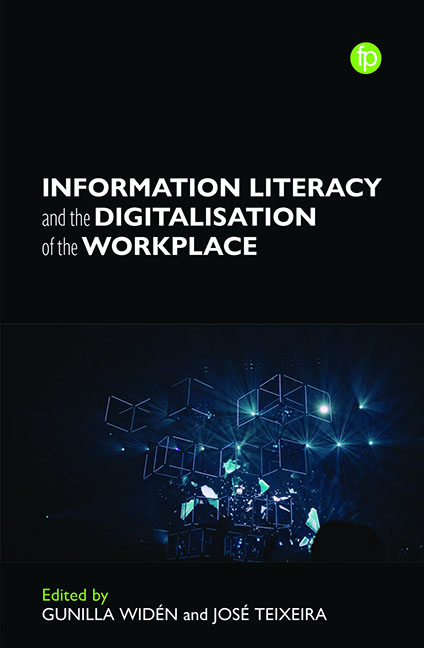Book contents
- Frontmatter
- Contents
- Figures and Tables
- Contributors
- Introduction: Advancing Theory on Workplace Information Literacy
- 1 Literature Review: In Search of the Many Meanings of Information Literacy
- 2 Digital Literacy in a Post-Digital Era: Rethinking ‘Literacy’ as Sociomaterial Practice
- 3 Methodological Choices of Information Literacy in the Workplace: Qualitative, Quantitative or Mixed-Methods?
- 4 Investigating Information Seeking and Information Sharing Using Digital Trace Data
- 5 Making Do With Limited Transparency of Sensitive Information in Secretive Organisations: Collective Information Literacy Through Hinting
- 6 Information Literacy Competencies for Career Transitions in the Digital Age
- 7 The Importance of Information Literacy for Work Satisfaction in a World-Wide-Workplace Context
- 8 Entrepreneurs’ Digital Information Sources Selection: A Perspective on the Impact of Information Literacy and Generational Differences
- 9 Conclusion: Workplace Information Literacy as the Literacy of the Digital Workplace
- Index
7 - The Importance of Information Literacy for Work Satisfaction in a World-Wide-Workplace Context
Published online by Cambridge University Press: 17 December 2023
- Frontmatter
- Contents
- Figures and Tables
- Contributors
- Introduction: Advancing Theory on Workplace Information Literacy
- 1 Literature Review: In Search of the Many Meanings of Information Literacy
- 2 Digital Literacy in a Post-Digital Era: Rethinking ‘Literacy’ as Sociomaterial Practice
- 3 Methodological Choices of Information Literacy in the Workplace: Qualitative, Quantitative or Mixed-Methods?
- 4 Investigating Information Seeking and Information Sharing Using Digital Trace Data
- 5 Making Do With Limited Transparency of Sensitive Information in Secretive Organisations: Collective Information Literacy Through Hinting
- 6 Information Literacy Competencies for Career Transitions in the Digital Age
- 7 The Importance of Information Literacy for Work Satisfaction in a World-Wide-Workplace Context
- 8 Entrepreneurs’ Digital Information Sources Selection: A Perspective on the Impact of Information Literacy and Generational Differences
- 9 Conclusion: Workplace Information Literacy as the Literacy of the Digital Workplace
- Index
Summary
Introduction
The aim of this chapter is to investigate one central component of workplace information literacy, namely information sharing at the workplace and its impact on work satisfaction.
Workplace information sharing has been defined as the activities of sharing day-to-day work-related information (Savolainen, 2017). In this chapter, we will consider information and knowledge sharing as synonyms, applying the term used in the literature we cite. Both the concepts of information and knowledge sharing essentially describe the activity of sharing (Pilerot, 2012; Savolainen, 2017).
In essence, white-collar work is about creating knowledge. Knowledge sharing among employees is, in turn, key for individual and organisational performance, innovation and efficiency (Ahmad and Karim, 2019). Ferguson and Lloyd (2007) argue that information literacy and knowledge management share many similarities in organisational contexts; both are applied to maximise the use of knowledge in organisations and foster knowledge sharing. Knowledge sharing is, therefore, a key component of information literacy (Leith and Yerbury, 2015).
In previous research, workplace information literacy has largely been investigated in the context of work performance and innovation (for example, Ahmad, Widén and Huvila, 2020). Less is known about the impact of workplace information literacy on socio-emotional aspects of work, such as work satisfaction. Worker wellbeing and work satisfaction are, however, just as important factors of working life as productivity. One key factor in work satisfaction is self-determination (Brunelle and Fortin, 2021). In this chapter, information sharing is investigated as a part of self-determination in the workplace, which in turn results in work satisfaction. This shows that aspects of workplace information literacy, such as information sharing, do not only influence work performance, but also psycho-social factors such as work satisfaction. In Chapter 2, Mård and Hallin refer to Lloyd's (2010) concept of information sharing as a key component of information literacy as a sociomaterial practice. In this chapter, information sharing is investigated as an individual practice related to work satisfaction. These chapters work in tandem, demonstrating that information sharing is part of the sociomaterial practice at work (see Chapter 2) and, at the same time, a factor influencing the individual employee's experiences and activity at work.
- Type
- Chapter
- Information
- Information Literacy and the Digitalisation of the Workplace , pp. 101 - 120Publisher: FacetPrint publication year: 2023



